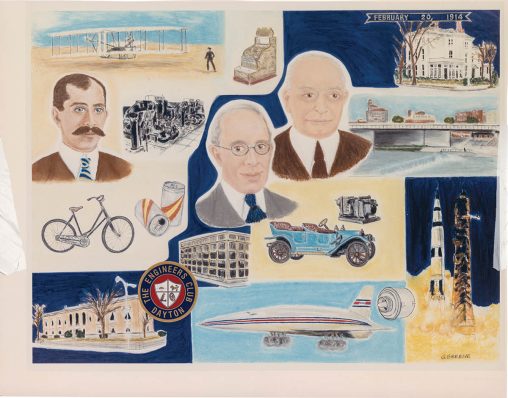By Jane Wildermuth, Head of University Libraries Special Collections and Archives
Dayton is renowned for its innovation and leadership in the STEM fields. Daytonians like the Wright brothers, Charles Kettering, Edward Deeds, and John Patterson pushed Dayton and Ohio to the STEM forefront.
In 1914, Charles Kettering and Edward Deeds established The Engineers Club of Dayton for the betterment of engineers in the Miami Valley. This group held member meetings, social events, and educational lectures. It promoted engineering collaborations and continues to do so.
Historically, engineering had been a male-dominated field. Even so, the club admitted its first female full member in 1936. Maude Elsa Gardner was one of only a few female aeronautical engineers in the United States at that time.
Based at Wright Field, she served as editor of Technical Data Digest and helped write an instruction manual for the Wright cyclone engine. Gardner was also the first woman to be a member of the Institute of Aeronautical Sciences (IAS). This exclusive group even refused membership to Amelia Earhart.
In the fall of 1988, Rosemary Speers and other students established Wright State University’s chapter of the Society of Women Engineers (SWE), which advocates for women in engineering and technology. Speers, who earned a degree in biomedical engineering in 1991, was elected the chapter’s president in early 1989.
She and her female engineering classmates wanted a group that would give them opportunities to network, collaborate, and support one another. It also gave them access to professional development and conference opportunities through the larger SWE organization.
Speers became a student member of the Engineers Club of Dayton after she won the club’s 1989 student paper competition. This allowed her to present her paper to club members working in the field. She was inspired to continue working in engineering research after completing her undergraduate degree.
Speers said her classes and labs prepared her well for graduate school at Northwestern University and the University of Michigan, where she earned her Ph.D. in biomedical engineering. She currently works as the chief scientist at Avail Solutions, supporting the U.S. government on science and policy for national security.
 Wright State University Special Collections and Archives is home to records of many different types of clubs in the Miami Valley, including social and professional clubs like the Engineers Club of Dayton, Garden Club of Dayton, Women’s Literary Club, and Dayton Philharmonic Volunteer Association. The historical records of these clubs include newsletters, photographs, minutes, histories, biographies of members, and more.
Wright State University Special Collections and Archives is home to records of many different types of clubs in the Miami Valley, including social and professional clubs like the Engineers Club of Dayton, Garden Club of Dayton, Women’s Literary Club, and Dayton Philharmonic Volunteer Association. The historical records of these clubs include newsletters, photographs, minutes, histories, biographies of members, and more.
To learn more about holdings, visit the collections guides webpage at wright.libraryhost.com.
This article was originally published in the 2024 issue of the Wright State Magazine. Read more stories at wright.edu/magazine.


 Walking through open doors
Walking through open doors  Adventures await
Adventures await  Wright State to expand nursing facilities to meet workforce needs and prepare more graduates for in-demand careers
Wright State to expand nursing facilities to meet workforce needs and prepare more graduates for in-demand careers  Wright State student-athletes make a lasting impact on local family with more to come
Wright State student-athletes make a lasting impact on local family with more to come  Wright State names Rajneesh Suri dean of Raj Soin College of Business
Wright State names Rajneesh Suri dean of Raj Soin College of Business 